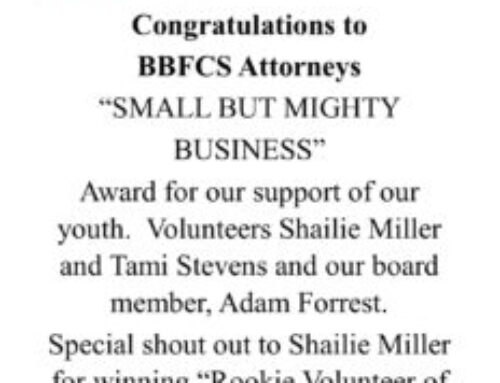I am often confronted with a client who has created a successful business and asks, “How can I keep this in my family after my retirement or death”? Needless to say, there are no easy answers and no guarantees of success, but progress can begin by at least asking the question. The biggest mistake I see – though often understandable – is simply being too busy with “work” to think about what happens in the future.
Generally, dad and/or mom have worked their entire lives to make the business successful and gradually one or more of the children have come on board to assist with services, and hopefully, ultimately management. Much depends upon the age and interest (not to mention talent) of the children, but if at least one child has become involved, consideration should be given to business succession within the family.
Before looking into how the business might be transferred to a family member either at death or retirement, care should first be given to how the children are being involved at present. The successful business owner with a child involved needs to ask the following questions:
1. Is my child truly interested in the long run to be involved in the business? Unfortunately, I have seen too many situations where dad or mom so dearly want the child to be involved, but the interest is not there. If this occurs, accept the fact and consider the alternatives. Is there another good non-family manager who is qualified to take over and who has the finances, at least over time, to purchase the business? The sale of a successful business is better for a family than seeing it diminished with a non-interested second generation owner.
2. Is my child appropriately involved at the present time? While experience is certainly first needed, some business owners wait too long to add management responsibilities to their children’s duties. If your business is a corporation, consider adding a child to the Board of Directors or as an officer. If the business is a partnership, consider making the child a partner, even with a minority interest, prior to leaving your own involvement. If you are a sole proprietor, consider creating an entity which would allow partial decision-making with the children. (Needless to say, the choice of entity has other far reaching ramifications, which can be discussed later.) Put simply, just make sure the children learn the management side of the business while you are around to help do the teaching.
3. Can financial ownership be currently transferred without relinquishing control? This question may be asked more than any other question by my clients. A parent may be ready to transfer ownership of the company to a child – either to assist the child financially or for estate planning purposes – but is not ready to relinquish control of the business to the child. This can be done and can be done in a variety of ways, depending upon the circumstances. Transfers of a minority interest within the business, either of stock in a corporation or a minority interest in a partnership or LLC, can be considered. The transfer can be through either compensation or through gifting, and various tax factors need to be considered regarding this choice.
There also exists more specialized methods for even transferring majority ownership interest, while retaining control. These include creating two classes of stock (voting and non-voting) in a corporation; creating a limited family partnership with the parent being the “general” partner and the children “limited” partners for ownership and distributions. Each of these have separate pros and cons, and separate articles could be written about each. Just remember that options do exist. Regarding the ultimate transfer of a business at retirement or death, more questions need to be asked by the successful business owner. These include the following:
1. Do I want my involved child to “pay” for the future ownership of the company? This may sound strange, with most clients trying to determine how to “give away” a business to a family member during life or death, with limited tax consequences, but a number of clients believe it is better for a child to pay for this opportunity. This may be especially true if there are other non-involved children, or more importantly, if mom and dad need this payment to live on financially after the business is transferred. There are, of course, other methods to keep the parents compensated, including “consulting fees”; continued minority interest ownership until death; pension plans; etc. However, “to pay” or “not to pay” is a legitimate first question. The result can also be for less than fair market value legally, although there may also be tax consequences from this choice.
2. Can I make a trust or will transfer dependent upon a child’s current involvement in the company? I have recently written a number of wills and trusts which make the timing of a business transfer dependent upon the age or experience of a child with a company. The interest until such time can be held by an independent trustee, a non-family manager of the business, or even other family members. At such time that a certain age or experience level is reached, the child could then be qualified to receive his or her transfer in the business. Consideration might also be given in such a situation to children who are not currently involved, but may later in their older years wish to become involved in the business.
3. If I have both involved and non-involved children, do I . . .
a. Give equal ownership to all children regardless of their involvement? (This may sound good, but I have unfortunately seen many situations where resentment can occur and family businesses flounder if a local involved child with the business is treated in similar fashion to an out-of-town non-involved child with other interests. While this may be prompted by good intentions, I am afraid more times than not this is not a good result.)
b. If I give the business only to the children involved, do I offset this bequest with other property of equal value to my other non-involved children, or do I “reward” the involved children with this business gift before I divide other assets equally? (The middle ground is also possible, with a required “payment” or “debit” to the involved child for less than fair market value regarding the business gift.)
c. Do I take into account that the non-involved child may later wish to become involved? (There are some specialized procedures which can be utilized here to make future bequests possible if later involvement occurs.)
I realize the length of this article does not allow specialized discussion of all possibilities to accomplish successful business succession planning; however, my goal has been to simply raise the appropriate questions and provide some ideas for decisions as you consider the possible future of your family owned business.
The information and opinions expressed in this article are for information only and are not to be construed as legal advice to any particular person or situation. Any specific factual situation should be reviewed by competent legal counsel of your choosing and the author hereby disclaims any responsibility or liability which might be asserted arising from reliance upon the enclosed information.











